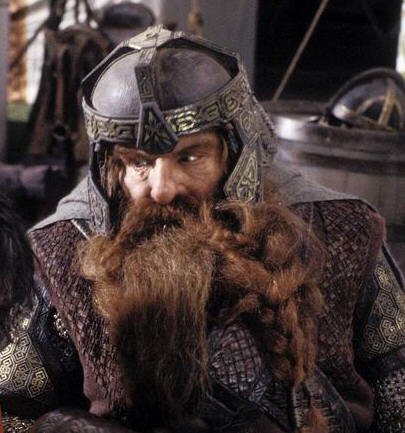
Continuing the Lord of the Rings discussion, here’s an interesting insight passed on to me by my friend Rachel Kranz about my last entry. I was interpreting my adolescent fondness for Gimli the dwarf as an indication that I felt myself a dwarf, hunkered down and plodding. Rachel says that she was stunned by this self-description since she experienced me as elvin rather than dwarfish when we met in college. What she admired, she says, was my enthusiasm and idealism. She also remembers thinking that I could use more grounding.
Perhaps I did a 180 between high school and college but I don’t think so. It’s more likely that I was in fact elvin in high school, despite feeling dwarfish. My attraction to Gimli, then, would be an aspiration, not an identification. Maybe I liked him because he was the opposite of those who seemed to float above the earth.
My own version of floating was getting caught up in ideas. “As if ideas only matter in the world they know,” Lucille Clifton says of intellectuals in general (and of me in particular) in a poem I have discussed in a past post. Such incredible lightness of being I inherited from my intellectual father and have been trying to temper ever since.
That I might have been yearning for dwarf grounding even in high school is suggested by my fascination at that time with a passage from Sartre’s play The Flies. Orestes and Electra have just killed their mother Clytemnestra (for having killed their father), and Electra wants to escape from what they’ve done. Orestes, by contrast, says they must take responsibility.
“We were too light, Electra,” he says. “Now our feet press down in the earth like the wheels of a cart in its groove. Come with me, and we will walk heavily, bending under the weight of our heavy load.”
I read the play in a senior year religion class and the quotation stuck with me so much that it surfaced again after my first son was born. “I was too light before,” I remember thinking as I held Justin in my arms. “Now life has become real.”
I realize I have some explaining to do here. I admit that, in one respect, I’m wrenching the quotation out of context. Orestes is calling upon Electra to accept responsibility for a death, not for a new life. But in another way I’m reading Sartre right—he says the business of living means taking on responsibilities for what one does in the world, which includes its heaviness as well as its joys. Electra wants to escape into childhood innocence, and Orestes calls on her to instead plunge into life, despite its messiness. As I gazed at a being that was utterly dependent on me and Julia for survival, Orestes’ call sounded bracing and inspiring. It was time to step into the business of being a father, knowing that life had suddenly acquired new seriousness.
Delving in the hard rock of the real (including changing diapers) has its own lyricism. One of my favorite passages in Lord of the Rings has always been Gimli talking about the proper way to uncover gemstones in new caves he has discovered. One doesn’t just wrench them out in a greedy display of acquisitiveness:
“No dwarf could be unmoved by such loveliness. None of Durin’s race would mine those caves for stones or ore, not if diamonds and gold could be got there. Do you cut down groves of blossoming trees in the springtime for firewood? We would tend these glades of flowering stone, not quarry them. With cautious skill, tap by tap – a small chip of rock and no more, perhaps, in a whole anxious day – so we could work, and as the years went by, we should open up new ways, and display far chambers that are still dark, glimpsed only as a void beyond fissures in the rock. And lights, Legolas! We should make lights, such lamps as once shone in Khazad-dum; and when we wished we would drive away the night that has lain there since the hills were made; and when we desired rest, we would let the night return.”
I think there may be a second drama involving my fondness for Gimli, by the way. My father, a bird watcher and nature lover, loved the elves most of all (he read us the entire Lord of the Rings out loud), so a son’s rebellion may have entered into my preference for Gimli. While I wanted to be like my father (and in many ways am so), I also sensed that he was not sufficiently grounded in reality—and that if I was to make it in the world, I needed to follow the lead of my more practical mother.
In short, I now think I was not a Gimli when I was young. I just wanted to be.

